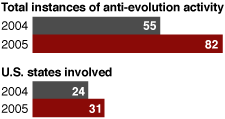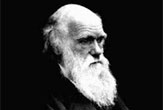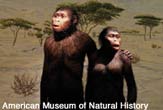
"Congress shall make no law respecting an establishment of religion, or prohibiting the free exercise thereof…"
Editor's Note: As part of a special report on the theory of evolution and an alternative idea known as intelligent design, LiveScience reviews current legislation and historically pertinent court cases.
Current State Legislation Involving Evolution
In 1925, the Tennessee State Legislature passed the Butler Act, a bill aimed squarely at evolution that made it illegal to teach any theory that denied the biblical account of creation. The bill was promptly challenged by the American Civil Liberties Union (ACLU) and thus began the famous Scopes Monkey Trial.
The plaintiff in the case was John T. Scopes, who was accused by the state of illegally teaching evolution to his high school biology class. In the end, Scopes was fined $100 by the judge, but a year later the Tennessee Supreme Court reversed the decision on a technicality and the case never went any further.
Since then, Darwin's theory of evolution has been tried by American courts 10 times (including a trial in Pennsylvania that began yesterday).
Two of those instances have been before the nation's Supreme Court. After each defeat, creationists have reinvented themselves in ever more sophisticated guises. First there was creationism, then creation science and now intelligent design, also known as ID.
Sign up for the Live Science daily newsletter now
Get the world’s most fascinating discoveries delivered straight to your inbox.
On the heel of each reinvention came a rash of antievolution legislation. The same spate of activity has occurred with ID.
This year alone, at least 17 bills challenging evolution's place in the public school curriculum have been considered in 13 states. Many of them also argue that a place be made in the classroom for ID. Here they are:
Alabama
Arkansas
Florida
Georgia
Kansas
Mississippi
Missouri
Montana
New York
Oklahoma
Pennsylvania
South Carolina
Texas
Utah
Historical Court Cases Involving Evolution
"Congress shall make no law respecting an establishment of religion, or prohibiting the free exercise thereof…"
Over the years, people attempting to ban evolution in classrooms or to peddle creationism as science have constantly found their efforts thwarted by these sixteen words. Known respectively as the “Establishment Clause” and the “Free Exercise Clause” of the First Amendment to the U.S. Constitution, these two statements together form the foundation of religious freedom in this country.
Of the many court cases involving government and religion, nine have dealt specifically with the treatment of evolution and creationism in public schools. LiveScience reviews them here:
Epperson v. Arkansas (1968)
Epperson sued the state, and the case was brought before the Supreme Court. The court ruled that the law violated the Establishment Clause and concluded that the primary motivation behind it was a literal reading of the Book of Genesis. In other words, the court found that there were no secular reasons for not teaching evolution, only religious ones.
Segraves v. State of California (1981)
The California Superior Court disagreed, pointing out that by law, scientific class discussions about the origins of life could focus only on how life might have developed, not on what its ultimate cause might be. Therefore, the teaching of evolution shouldn't be construed as either an establishment of religion or as an infringement upon anyone's religious beliefs.
Legislators in Arkansas thought so, and passed a law requiring the “balanced treatment” of evolution with “creation science.” When the case reached a federal court, however, the judge struck down the law and ruled that creation science wasn't really science because its language was based on creationist text.
Edwards v. Aguillard (1987)
That was the thinking of Louisiana legislators when they passed the state's “Creationism Act,” which made it illegal to teach evolution unless creation science was taught as well.
The Supreme Court found the act unconstitutional. By implying that a supernatural being created humankind, creation science was an impermissible endorsement of religion. The court pointed out that teachers were never forbidden from presenting alternative scientific theories before the act was passed. Therefore, the real purpose of the act was to tack creationism onto any curriculum that included evolution.
Webster v. New Lenox School District (1990)
A student complained, and when a school superintendent warned him to stop, Webster sued, claiming that his First and Fourteenth Amendment rights were being violated.
The case was eventually brought before the Seventh Circuit Court of Appeals, which ruled that teaching creation science for any reason was a form of religious advocacy and that schools could prohibit teachers from teaching it.
Peloza v. Capistrano School District (1994)
Teaching it in public schools therefore violated the First Amendment rights of both students and teachers, Peloza said, because it imposed a religion on the former and restricted the religious views of the latter.
The Ninth Circuit Court of Appeals didn't agree and dismissed Peloza's claim, saying that it rested on the false assumption that evolution denied the existence of a creator. The court further ruled that a public employees right to free speech could be restricted while on the job because they are representing the government.
Freiler v. Tangipahoa Parish Board of Education (1997)
The Fifth Circuit Court of Appeals saw through the creationist ruse, however, and found that the disclaimer did not in fact promote critical thinking because it essentially told students not to question what they already knew. The judges further concluded that the motivation behind the disclaimer was religious and therefore unconstitutional.
LeVake v. Independent School District 656 (2001)
LeVake sued, arguing that he was being discriminated against because of his religion and that his right to free speech was being violated in order to silence his criticisms of evolution.
The district court judge ruled that it was a public school teacher's responsibility to teach evolution according to the curriculum and that teachers could be prevented from teaching a biology course if they couldn't adequately teach evolution.
Selman v. Cobb County School District (2005)
Five local parents sued the school district, claiming that the stickers inhibited the teaching of evolution and promoted a view about the origins of life that was faith-based.
A district court judge agreed and said the sticker "misleads students regarding the significance and value of evolution in the scientific community." The judged ruled that the stickers undermined the first amendment and that the stickers must be removed.
- SPECIAL REPORT: Evolution & Intelligent Design
- Court Case Threatens to 'Drag Science into the Supernatural'
- Nobel Prize Winners Speak Up to Support Evolution
- Top 10 Missing Links in Human Evolution
- Poll: Public Divided on Evolution
- Evolution's Vestigal Organs
- Top 10 Creation Myths
Challenging Darwin
The number of global actions against evolution by national governments, state legislatures, and state and local boards of education is growing. The vast majority of the cases are in the United States.

LiveScience graphic
Credit: National Center for Science Education

SPECIAL REPORT
Evolution & Intelligent Design
PART 1
An Ambiguous Assault on Evolution
This Trojan Horse for Creationism has become very popular. But who is being duped? And what does it all mean for morality?
PART 2
Intelligent design is presented as a legitimate scientific theory and an alternative to Darwinism, but a close look at the arguments shows they don't pass scientific muster. So why are scientists worried?
PART 3
As evolution takes a beating, scientists remind us of the difference between fact, theory and belief.
PART 4: (TODAY)
Anti-evolution Attacks on the Rise
Each time the effort to introduce creationism into classrooms starts up again, so does legislation aimed against evolution. Learn about the rash of recent cases, plus a look at historically pertinent court cases.
Evolving Issue

Discoveries that have helped build the puzzle of mankind's evolution.

Creation Myths
Legends that helped define civilizations past and present.

Vestigal Organs
Darwin argued that useless limbs and leftover organs are evidence of evolution.









